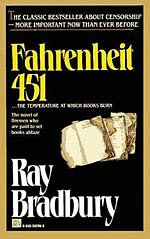
![]() jfrantz
jfrantz
3/4/2012
![]()
Rule 1. Answer the alarm swiftly.
2. Start the fire swiftly.
3. Burn everything.
4. Stand alert for other alarms.
Page 35
Does everyone know the plot of Fahrenheit 451? I think so. Firefighters no longer put fires out, but start them. Books have been outlawed so they burn books, and the houses they're in. One firefighter, Guy Montag, begins to question his role in society after meeting a strange girl who is convinced there is more to life than driving fast and watching television.
Memory
I'm not sure but I think I must have been in high school when I read this book for the first time and I remember generally enjoying it, but I don't remember what about it I liked. This time around, I felt so inured to the censorship theme that I was uninterested in reading it. Of course, by the die's decree I have no choice but to read it, so I forced myself.
I first read it long enough ago that I only remembered most of the major events about the book and none of the details. I had the strangest experience though when, near the end of the book, Montag imbibes an elixir which is meant to disguise his scent and he's told, "You'll stink like a bobcat, but that's alright." I didn't find it all that funny this time around, but reading this specific phrase recalled a memory of sitting somewhere, in class, or in my room when I read that for the first time and thinking it was the most hilarious thing I'd ever read. The recall was so detailed and it ran through my head so vividly that it almost made the phrase funny again. It was a really strange and really cool feeling.
It was so unexpected, I hadn't even remembered that line. I really enjoyed trying to hold onto that fleeting, but strong, mental connection. Weird, the things we hold onto. It is somewhat fitting though, as Montag struggles with his memory of what life was like before, and occasionally gets flashes of distant memories of his past.
How (not) to read this book
This book is ostensibly a story about the perils of censorship and the book cover (the picture this week is not my copy) really tries hard to prime your understanding of the book in this way (maybe it's the publisher's idea of satire). But based on Bradbury's own note at the end (my printing included an Afterward and Coda! Really?), that seems to be the theme that he was most concerned with when writing it. People, I'm here to tell you, you don't have to read it this way! That's right, I'm the F451 gadfly.
Return to rule 3 of the Firefighters Code. Burn everything. The Code struck me as a very powerful image in my second read and I think this is one of the first hints into what is going on below the surface of Bradbury's horrible method of telling, not showing (one of the most severe crimes a writer can commit). We begin to find that it isn't just part of the Firefighter's Code, but that all of society is on a path toward complete destruction. Of books, of friends, of families, all of society is in rapid decline. All-out war threatened to destroy everything and everyone. Husbands and wives spend their lives together and don't know a single thing about each other. Montag can't even remember how he met his wife.
These are the phenomena that really upset Montag. He had everything in the world to make him happy and he was still miserable and what's worse, he had no idea why or what to do about it. It is only when he comes to believe that books are the only tool remaining that might possibly set humanity right again that he obsesses with saving books and bringing down the firefighters. Montag wasn't on a crusade to see to the survival of books; he was on a crusade to save his species!
I think what has made people so hooked on the censorship issue is only that Bradbury hammers his readers over the head with lectures far worse than Heinlein ever did. And even though the book also warns against allowing others to tell us what to believe, we still listen, rapt, to Bradbury's, skin-deep interpretation (Bradbury loved starting sentences with conjunctions too). Just because you create a work of art, doesn't mean you have the final say regarding what is important and why. That is my job ;)
Considering recent world events, the idea of such strict censorship and governments limiting communication are still very poignant and just as scary as in 1953. But as I said, I've become so de-sensitized to the story over the years that this wasn't the most interesting aspect to me. You'll get out of it whatever you want, but know there are other things going on below the surface if you care to look.
Recommendation
I have the rest of the nominees from this year lined up in my audiobook queue. I have a strong suspicion that this book could only be chosen in hindsight, because so many people are nostalgic about it, not that it was the "best." I didn't love the book, but I also didn't hate it. It was just kind of...meh... There were still a number of elements that make the book historically significant and worth reading if you've never gotten around to it. Bradbury has a way with words that even if he force feeds readers, he can create moods and set up a scene in a way that is just amazing.
http://hugoenduranceproject.blogspot.com/